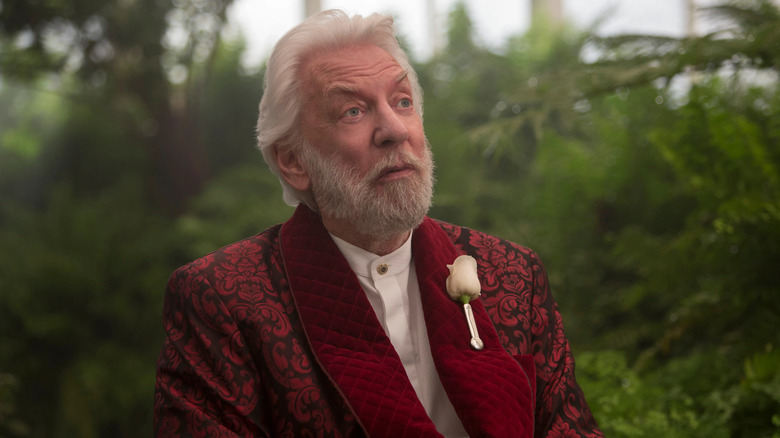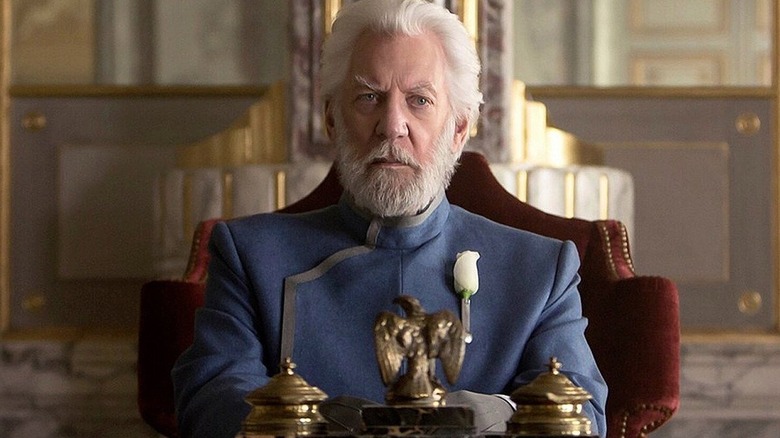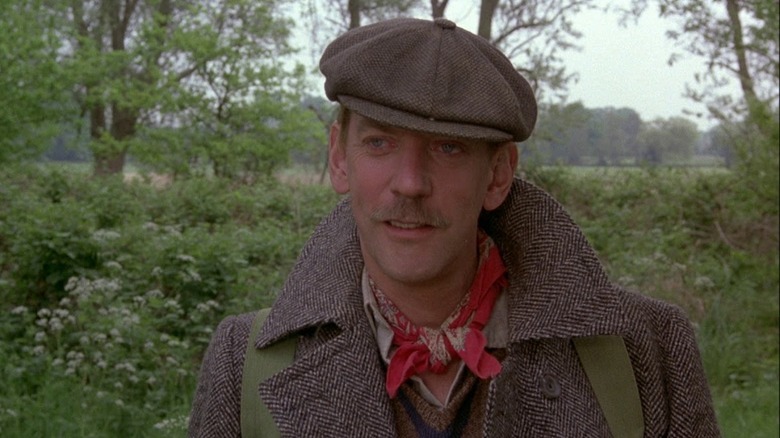Donald Sutherland Wrote A Perfect Letter To Give The Hunger Games Movies A New Perspective
The world recently lost one of the greatest actors to ever do it, when Donald Sutherland passed away at the age of 88. A legendary performer with an on-screen career spanning more than half a century, Sutherland brought to life countless characters that could all be considered "his best." Vernon Pinkley in "The Dirty Dozen," John Baxter in "Don't Look Now," Hawkeye Pierce in "M*A*S*H*," Matthew Bennell in "Invasion of the Body Snatchers," Mr. Bennet in "Pride & Prejudice," and John Klute in "Klute" would all be career-making roles for any other performer, but for Sutherland, they were just another day at the office. However, there's an argument to be made that his greatest performance came with one of his most recent roles — one that helped introduce him to a much younger generation. I'm talking, of course, about President Corolanius Snow in "The Hunger Games" series.
President Snow is one of the most interesting cinematic villains of the 21st century, so much so that the prequel book and film "The Ballad of Songbirds and Snakes" was written specifically to explain how this once-charming man became a tyrannical dictator. Suzanne Collins took great care in creating the character in her books, but perhaps no one else understood his true nature more than Donald Sutherland. As part of the promotional materials for the first "Hunger Games" film, an extensive letter Sutherland wrote to director Gary Ross titled "Letters from the Rose Garden" was released, which highlighted the research, dedication, and character development the gifted actor conducted to embody Snow as authentically as possible. It's a poetic examination of power, influence, and perspective.
Sutherland's letters were responsible for the Rose Garden scenes
During the first "The Hunger Games" film, there are multiple scenes of President Snow having private discussions in his rose garden, which originally wasn't part of the script. It was Ross' response to Sutherland's letter that made him want to include the scenes, which are, in this writer's opinion, vital to the success of the story. "That's the relationship you want from an actor and director, where it's a give and take," Ross told Business Insider. "It's collaborative, it's one person offering something to the other who then takes it, extrapolates it, runs with it, give it back to the actor who gives the scene back to me ... that's the way filmmaking works best."
In Sutherland's letter, he discussed power and how it "perpetrates war and oppression to maintain itself until it finally topples over with the bureaucratic weight of itself and sinks into the pages of history (except in Texas), leaving lessons that need to be learned unlearned." He cited the ways power famously corrupts men and turns them into horny weirdos, but believed that Snow's obsession with power was rooted in something entirely different, as reflected by the character's dedication to his rose garden.
"I didn't want to write to you until I'd read the trilogy and now I have so: roses are of great importance," he wrote. "And Coriolanus's eyes. And his smile. Those three elements are vibrant and vital in Snow. Everything else is, by and large, perfectly still and ruthlessly contained." This section alone is evident in Sutherland's performance. There are moments where we as the audience know he's beyond evil, but his smile and his eyes bring great warmth to cold situations. It's a reminder that he's not a monster, he's human, and we're all capable of great evil if not kept in check.
Threading the Eye of the Needle
Sutherland also noted that in terms of the books, everything is told through Katniss Everdeen's point of view, so President Snow is presented through her interpretation of him, and not necessarily his true thoughts or feelings. "Evil looks like our understanding of the history of the men we're looking at," he wrote. "It's not what we see: it's what we've been led to believe. Simple as that. Look at the face of Ted Bundy before you knew what he did and after you knew." He also compared President Snow's specific brand of evil to another character in his arsenal. "Snow's evil shows up in the form of the complacently confident threat that's ever-present in his eyes. His resolute stillness," wrote Sutherland. "Have you seen a film I did years ago? 'The Eye of the Needle'. That fellow had some of what I'm looking for."
"Eye of the Needle" is a World War II spy film where Sutherland played Henry Faber, an emotionless German sleeper agent who prefers to take out his targets with a stiletto dagger. He discovers information that would prevent D-Day from happening, the seaborne invasion that would lay the foundations for the Allied victory on the Western Front. It's one of the darkest roles Sutherland ever played, but made for a wonderful ending anecdote to his note:
"This woman and her husband had seen that movie the night before and what she wanted to know was how my wife could live with anyone who could play such an evil man. It made for an amusing dinner or two but part of my wife's still wondering. I'd love to speak with you whenever you have a chance so I can be on the same page with you. They all end up the same way. Welcome to Florida, have a nice day!"
Farewell Donald Sutherland. Thank you for everything.


